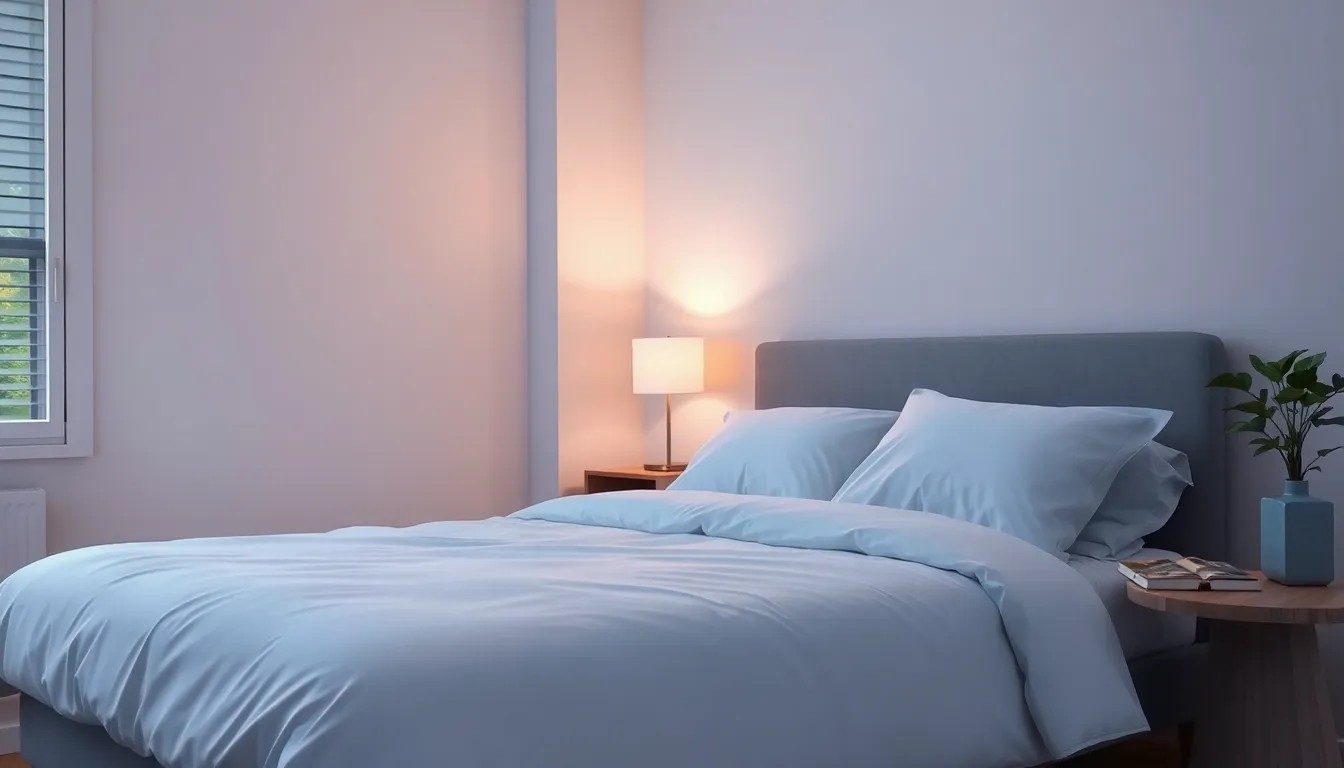In a world where sleep often takes a backseat to Netflix binges and late-night snacks, the concept of clean sleeping is a breath of fresh air—or maybe more like a cozy pillow. Imagine drifting off to dreamland in a space that’s not just comfortable but also free from the chaos of clutter and distractions. Clean sleeping isn’t just about snoozing; it’s about creating a sanctuary for rest that leaves you feeling rejuvenated and ready to tackle the day.
With the right approach, clean sleeping can transform your nights from tossing and turning into blissful slumber. It’s time to kick those sleep-stealing habits to the curb and embrace a lifestyle that prioritizes quality rest. So grab your favorite pajamas, fluff your pillows, and get ready to discover how a few simple changes can lead to the best sleep of your life.
Table of Contents
ToggleWhat Is Clean Sleeping?
Clean sleeping refers to adopting habits that promote restful and high-quality sleep. This concept emphasizes the need for a sleep environment free of distractions and disruptions. Creating a sanctuary that fosters relaxation plays a vital role in achieving restorative sleep.
Improving sleep hygiene involves several key practices. Maintaining a consistent sleep schedule enhances the body’s natural circadian rhythm. Limiting screen time before bed reduces exposure to blue light, which can interfere with sleep.
A comfortable sleep environment is essential. Keeping the bedroom dark, quiet, and cool encourages deeper sleep. Investing in high-quality bedding and pillows supports proper alignment and comfort.
Diet also influences sleep quality. Avoiding heavy meals and caffeine close to bedtime helps minimize discomfort and restlessness. Additionally, moderating alcohol consumption promotes better sleep cycles.
Exercise contributes to clean sleeping as well. Engaging in physical activity during the day can help regulate sleep patterns. However, scheduling workouts earlier in the day prevents overstimulation before bedtime.
Mental health affects sleep quality too. Practicing relaxation techniques, like meditation or deep breathing, can reduce stress and anxiety. Incorporating these techniques into the evening routine allows for a smoother transition to sleep.
Fostering clean sleeping habits leads to improved overall health. Establishing a dedicated wind-down routine signals the body that it’s time to rest. Prioritizing these strategies cumulatively enhances restorative sleep, leading to increased energy and focus during waking hours.
Benefits of Clean Sleeping


Clean sleeping offers numerous benefits for overall health and well-being. Prioritizing sleep promotes both physical and mental rejuvenation.
Physical Health Advantages
Clean sleeping significantly enhances physical health. Improved sleep quality supports immune function, reducing the likelihood of illness. Heart health also benefits; studies show better sleep reduces blood pressure and lowers the risk of heart disease. Weight management improves, as quality sleep regulates hormones related to hunger. Additionally, consistent sleep helps in muscle recovery and boosts overall athletic performance, ensuring individuals feel energized and agile during daily activities.
Mental Health Advantages
Mental health sees marked improvement with clean sleeping habits. Quality sleep enhances cognitive functions like memory retention and concentration, leading to better productivity. Emotional well-being also flourishes; individuals experience reduced anxiety and depressive symptoms when they sleep well. When sleep is prioritized, stress management becomes more effective, allowing individuals to handle daily challenges with greater resilience. Regular clean sleeping fosters a balanced mood, ultimately uplifting overall mental clarity and happiness.
Tips for Practicing Clean Sleeping
Practicing clean sleeping involves several key techniques that enhance sleep quality and overall well-being. By focusing on routine, environment, and technology use, individuals can improve their nightly rest.
Establish a Sleep Routine
Maintaining a consistent sleep schedule helps align the body’s internal clock. Going to bed and waking up at the same time each day trains the mind and body for better rest. Setting a wind-down period, ideally an hour before bedtime, signals the brain to prepare for sleep. Including calming activities, such as reading or gentle stretches, can create a peaceful transition. Avoiding naps, especially in the late afternoon, ensures that nighttime rest remains uninterrupted. The body craves routine, fostering better sleep habits over time.
Create a Sleep-Friendly Environment
Designing a calming sleep environment promotes restful nights. Keeping the bedroom dark allows melatonin production to flourish, making it easier to fall asleep. Temperature control matters; a cooler room typically encourages deeper sleep. Investing in quality bedding enhances comfort, which directly supports proper alignment during rest. Noise reduction also plays a role; using earplugs or a white noise machine can drown out disruptions. Personalizing the room with soothing colors and scents creates an inviting space conducive to relaxation.
Limit Screen Time Before Bed
Reducing screen time before bedtime is crucial for improving sleep quality. Blue light emitted from devices like phones and computers can interfere with melatonin production. Setting devices aside at least one hour before sleep minimizes the risk of disrupted slumber. Instead of scrolling through social media, engaging in non-screen activities, like journaling or meditating, can promote relaxation. Creating a technology-free zone in the bedroom supports healthier sleep habits. Prioritizing this step can lead to more restorative sleep and enhanced daily focus.
Common Challenges in Clean Sleeping
Clean sleeping faces various challenges that can hinder the ability to achieve restorative rest. Identifying these obstacles can assist in developing strategies to overcome them.
Stress and Anxiety
Stress and anxiety negatively affect sleep quality. Continuous worrying disrupts the mind, making it difficult to relax. Mental health issues can trigger chaotic sleep patterns. Effective relaxation techniques, such as meditation or deep breathing, help create a sense of calm. Incorporating these methods into daily routines promotes emotional stability and encourages restful nights. Furthermore, seeking professional support can address underlying issues, leading to improved mental health and better sleep.
Poor Sleep Habits
Poor sleep habits are often ingrained behaviors that interfere with clean sleeping. Irregular sleep schedules confuse the body’s internal clock. Constant late-night screen use introduces blue light, disrupting melatonin production. Adopting a consistent sleep routine forms a solid foundation for improved rest quality. Limiting caffeine consumption and heavy meals before bed minimizes discomfort. Additionally, reducing screen time through alternative relaxing evening activities enhances the likelihood of falling asleep swiftly. Understanding and changing these habits significantly impacts sleep health.
Embracing clean sleeping can transform not just the quality of sleep but also enhance overall health and well-being. By prioritizing restorative sleep and adopting healthy habits, individuals can experience increased energy, improved mental clarity, and a balanced mood.
Creating a sleep-friendly environment and establishing a consistent routine lays the foundation for better sleep hygiene. As distractions and stressors continue to rise in today’s fast-paced world, committing to clean sleeping practices becomes essential for achieving optimal health.
With dedication and mindful adjustments, anyone can unlock the numerous benefits of clean sleeping and enjoy the rejuvenation that comes with a good night’s rest.




